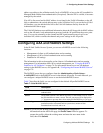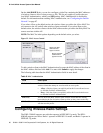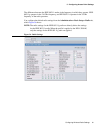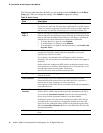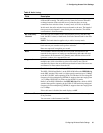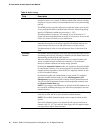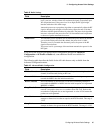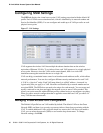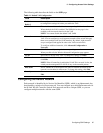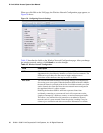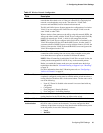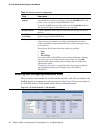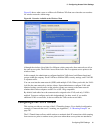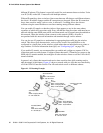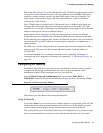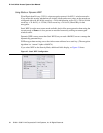
Configuring SSID Settings 87
5 Configuring Access Point Settings
The following table describes the fields on the SSID page.
Configuring the Default Network
Each network is identified by its Service Set Identifier (SSID), which is an alphanumeric key
that identifies a wireless local area network. You can configure up to 64 different networks on
the D-Link WLAN Controller Switch. Each network can have a unique SSID, or you can
configure multiple networks with the same SSID.
Table 11. Default VAP Configuration
Field Description
Radio 1
Radio 2
You configure the VAPs for Radio 1 and Radio 2 separately. Select the radio
to configure the settings for before you enable the VAP.
Check Box This check box enables or disables the corresponding VAP on the radio.
When checked, the VAP is enabled. The SSID field on the page is also
enabled to allow network selection for the VAP.
NOTE: You cannot disable the default VAP, VAP0.
Network The drop-down menu lists the available networks that you can assign to the
VAP. You can configure up to 64 separate networks on the switch and apply
them across multiple radio and VAP interfaces. By default, eight networks
are pre-configured and applied in order to the VAPs on each radio.
To configure additional networks, click Advanced Configuration >
Networks.
Edit Click Edit to modify settings for the corresponding network.
When you click edit, the Wireless Network Configuration page appears.
VLAN Shows the VLAN ID of the VAP. To change this setting, click Edit.
L3 Tunnel Shows whether L3 Tunneling is enabled on the VAP. To change this setting,
click Edit.
NOTE: When L3 tunneling is enabled the VLAN ID is not used. In fact, the
switch puts the management VLAN ID, if any, on the tunneled packets.
Hide SSID Shows whether the VAP broadcasts the SSID. If enabled, the SSID for this
network is not included in AP beacons. To change this setting, click Edit.
Security Shows the current security settings for the VAP. To change this setting, click
Edit.



